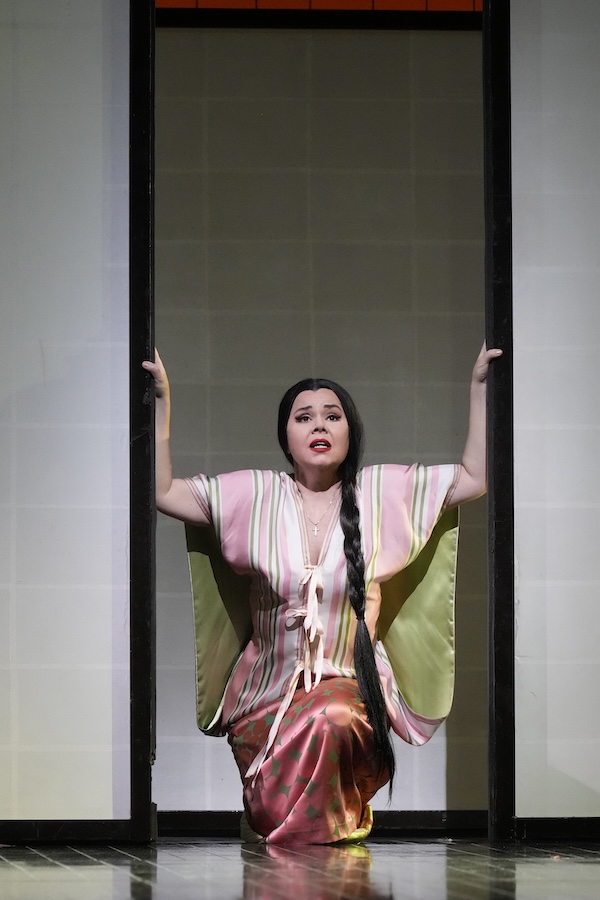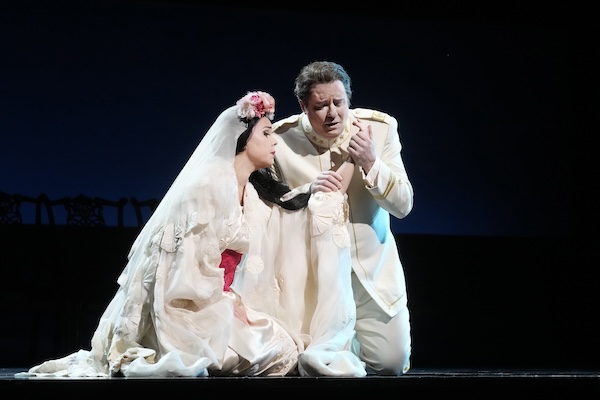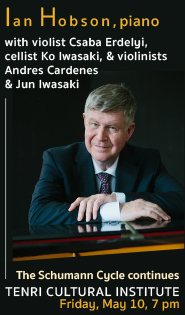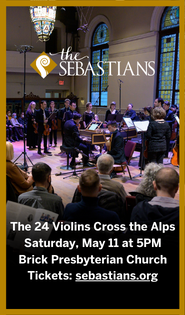Met’s “Butterfly” returns to the nest for extended season run

Anthony Minghella’s stark, powerful production of Puccini’s Madama Butterfly returned to the Metropolitan Opera on Thursday evening. Running through mid-May, it forms the backbone of the remainder of the Met’s season. Aleksandra Kurzak is the first of the three sopranos to perform the role of Cio-Cio-San, with Eleonora Buratto and Asmik Grigorian to follow. With this performance, Xian Zhang, who will conduct most performances, made an auspicious debut in the pit.
Unveiled on opening night of the 2006-07 season, Minghella’s concept garnered attention for his use of Japanese Bunraku-style puppets to represent Cio-Cio-San’s son and, in a dream sequence, Butterfly herself. Unlike most Western forms of puppetry, Bunraku is a serious and sophisticated form of theater. In Minghella’s hands, it lends simplicity, poignancy, and profound despair to the drama, underscoring that Butterfly and her child are little more than passive pawns in the machinations of Pinkerton, the vain and callous American naval officer.
The production isn’t propelled by the puppetry alone, with the simplicity and potency of Minghella’s imagery and his brilliant use of color also manifest. The set is no more than a series of mobile Shoji screens. A few sticks of Western-style furniture and lanterns are the only real stage elements, but Minghella works magic with those glowing white orbs.
The color red blazes through the production symbolizing hope, passion, and death. Butterfly’s red obi, or sash, becomes the net in which she is ensnared. When she commits ritual suicide with the same knife as did her disgraced father before her, the obi expands in lurid red streams to the far depths of the Met’s stage. This, along with the rest of the action, is reflected in mirrors hung above the stage which add a dreamlike, disconcerting aura to the action.
With this performance, Aleksandra Kurzak made her Met role debut as Butterfly. She has most of the makings of a great Butterfly, except volume. She is not the first aspiring Butterfly to have a voice too small to do full justice to the role. It was a complaint that the composer had regarding Geraldine Farrar, the Met’s first Butterfly. As was seemingly the case with Farrar, the lack of vocal heft, however, did not diminish the audience’s enthusiasm for Kurzak’s performance.
Kurzak’s bubbly personality made for a delightful fifteen-year-old girl rapturously in love with an American sailor. Even then, however, tragedy was etched into Kuzak’s characterization, especially when there was any mention of her father. Her Butterfly deepened emotionally and vocally, as she gained in wisdom and understanding until her dreams evaporated.
Kurzak is a wise singer, never pushing her essentially lyrical voice too hard for dramatic ends. The opening measures of “Un bel di”, in which Butterfly sings of the day on which Pinkerton will assuredly return to her, were stunning for their simplicity and beauty. Nobility, however, was equally at Kurzak’s command, notably in Act II when she tells Sharpless that she would rather die than return to the life of a geisha, and the subsequent surrender of her son to Pinkerton’s wife. With a searing “Tu Tu Piccolo Iddio!,”, Kurzak bid farewell to her son and life.
The success of Kurzak’s performance was due in no small part to Xian Zhang’s sensitivity as a conductor. Zhang has an exceptional ear for balance, as well as the ability to draw the softest, most transparent tones imaginable from the orchestra. With such a conductor, Kurzak was therefore able to express Butterfly’s most intimate feelings effectively and effortlessly.
Zhang, however, was equally adept in capturing the tragedy of Puccini’s tragedy with precision and passion. There was terror in the terrifying drum beats that announce the entrance of Yamadori, a rich man eager to have Cio-Cio-San as his wife, or the horrifying slashes of sound which accompany Butterfly’s expressions of despair in Act III. With such skills and obvious audience appeal, Zhang should prove a valuable addition to the Met’s conducting staff.

Matthew Polenzani reprised his seasoned Pinkerton. The tenor’s demeanor as the shallow American naval officer ranged from insouciance and passion, to wooden impassivity in the final scenes, when he is unable to cope with the consequences of his actions. Vocally, Polenzani was in fine form, alternately expressing his wonder at Cio-Cio-San’s exquisite beauty and youth with tenderness of feeling and sweetness of tone and his passion in blazing streams of rich, molten sound in the love duet.
With this run, Davide Luciano is making his Met role debut as Sharpless. Previously seen as Belcore in Donizetti’s L’Elisir d’Amore Marcello in Puccini’s La bohème, Sharpless shows the baritone to better advantage both dramatically and vocally. There was sparkle in Luciano’s voice as he joins Pinkerton in good-nature bonhomie, replaced by depth and true tragedy in the final act as his worst fears as to Butterfly’s fate are realized.
The most impressive performance of the evening, however, came from Elizabeth DeShong as Cio-Cio-San’s maid Suzuki. DeShong’s commanding mezzo-soprano anchored every scene in which she appeared, as did her sensitivity as an actress in portraying Suzuki’s unshakable stoicism and strength. The heartfelt applause which rang out when she took her solo bow, acknowledged that she had indeed given a special performance.
Madama Butterfly continues through May 11. metopera.org








Posted Jan 13, 2024 at 10:13 am by Dita Sullivan
In my opinion Aleksandra Kurzak’s performance is the best Cio-Cio San since that of Stratas. She inhabits the role with haunting beauty: her voice is pure honey, her movements and gestures are the epitome of grace.
Posted Jan 21, 2024 at 10:34 am by Carolyn schaefer
This is a great production and performance of Madam Butterfly. Even though we were towards the back of the theater, we could hear and see perfectly. The acoustics are the best. And it was nice to see some opera lovers still dress for the occasion. Carolyn